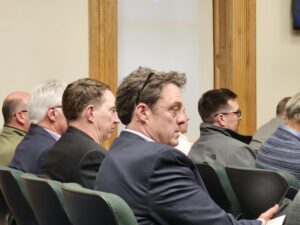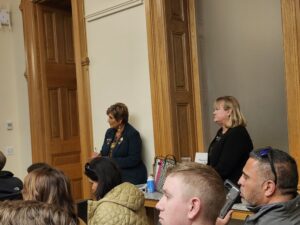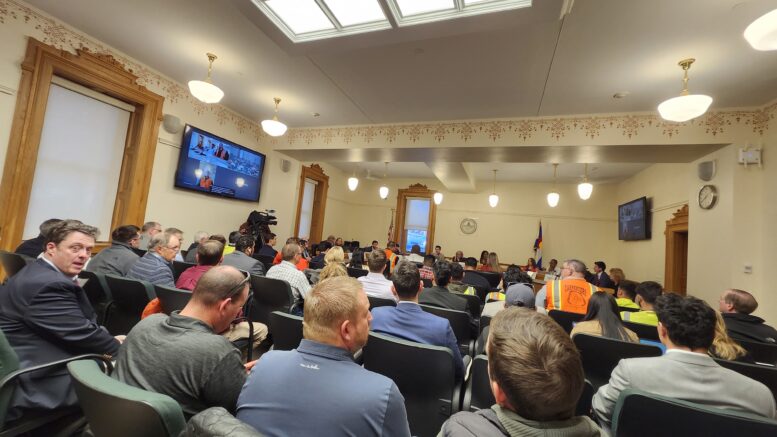Democrats on a Colorado House committee enthusiastically advanced a bill Thursday that would make construction general contractors jointly liable for wages their subcontractors fail to pay, despite warnings that the measure’s costs could hurt smaller firms.
House Bill 1008 continues the party’s decade-long quest to crack down on wage theft by targeting a particular industry that is responsible for somewhere between 9% and 15% of the wage-theft claims filed in Colorado. It uses a 2023 Denver law as its framework but nixes that law’s need for unpaid workers to move up a ladder of subcontractors to recover wages, instead letting them to go directly to general contractors who hired the subcontractors that led to the hiring of complainant workers.
Proponents, including unions and workers’ rights organizations, said pointedly that putting general contractors on the hook for subcontractors who try to skirt payment by dissolving or skipping town will incentivize the larger companies to vet their partners more closely. It also will allow for those workers to be made whole, as Colorado Department of Labor and Employment enforcement actions and lawsuits only can produce judgments against the subcontractors but not force them to pay the money that’s owed.
“Currently, the burden falls most on those lower-wage workers to chase subs,” said Rebecca Galemba, an associate professor at the University of Denver whose studies have found that only a small percentage of wage-theft claimants ever receive reimbursement. “Chasing lower-level subs is often a fruitless dead end.”
A host of consequences for contractors
But construction leaders questioned why their sector would be singled out, particularly as Michael Gifford, Associated General Contractors of Colorado advocacy director, noted the state found just 145 valid wage-theft claims last year in an industry with 180,000 workers. Several business groups, including the Colorado Chamber of Commerce and the Colorado Competitive Council, asked that CDLE be given more enforcement personnel and the ability to enforce claims above $7,500, which now must go to court, and even several supporting legislators asked that such an amendment be considered on the House floor.

David Scott, construction industry advocate for Encore Electric, and Jack Tate, president/CEO of Associated Builders and Contractors Rocky Mountain chapter, listen to debate on HB 1008 Thursday.
HB 1008 could perversely incentivize lower-level subcontractors to not pay workers, as they know that general contractors ultimately are responsible for those non-payments, warned Wheat Ridge Mayor Bud Starker, a 50-year industry veteran. Rep. Sheila Lieder, D-Jefferson County, pushed back on that by saying that doing so would make such firms largely unemployable in the industry in the future.
But also, the bill could lead general contractors to impose surety bonds on potential subcontractors that could raise the overall price of their work and of construction by 3% to 5%, several construction-firm operators said. And if smaller firms would have to purchase such bonds to work on projects, that could serve as a barrier to undercapitalized companies, including those owned by women and minorities, to being able to find jobs, others said.
“I think everyone agrees with the premise that wage theft should not happen,” said former Sen. Jack Tate, recently hired as president and CEO of the Associated Builders and Contractors Rocky Mountain chapter. “But you want to bruise every apple in the barrel to deal with a couple of bad apples at the bottom.”
Debate over whether bill could raise costs
Rep. Meg Froelich, the Greenwood Village Democrat who co-sponsored HB 1008 with Democratic House Majority Leader Monica Duran of Wheat Ridge, said there’s been no indication of contractors requiring higher bonds in the 10 other states with similar laws. And Matthew Fritz-Mauer, executive director of Denver Labor in the Denver Auditor’s office, said city leaders haven’t seen such bonding requirements since they instituted their law roughly one year ago.
Gifford pointed out, however, that the Denver law is different in two major ways. First, it applies to all industries equally.
And second, it lets the Denver Auditor go after subcontractors to attempt to collect unpaid wages and then shifts responsibility to the subcontractors who hired those subcontractors before requiring general contractors to make payments. Because the enforcement agency has so many opportunities to collect payments before coming to the general contractors, those larger firms don’t feel the need to impose subcontractor bonds in the city, Gifford said.
Changes to construction wage theft proposal

Colorado state Reps. Monica Duran and Meg Froelich watch debate on their construction wage-theft bill from the side of a committee room Thursday because every seat in the room was taken.
Froelich and Duran made several amendments to the originally introduced version of HB 1008 at the suggestion of contractors’ groups, including delaying enforcement of the bill, were it to become law, until July 2025. They also changed the bill to clarify that general contractors are not responsible for retaliation carried out by subcontractors, require that any wage-theft claims be made for duties within the scope of service laid out by the general contractor and clarified that contractors are not responsible for any wage theft alleged against suppliers.
In the end, however, it was a fully partisan, Democratic-led 8-3 vote that sent the bill out of a committee that is considered one of the more business-friendly committees in the House and onto the floor of the chamber for its next debate.
And the nearly four hours of testimony and discussion over the bill seemed to do nothing to bridge the chasm on how some workers’ groups and business groups view wage theft.
Competing views on prevalence of construction wage theft
Mark Thompson, a representative for the Western States Carpenters union who wrapped up testimony for HB 1008 proponents, declared: “The construction industry is dirty … It’s polluted with wage theft.”
Wage theft can refer not just to complete failure to pay wages but also to failure to pay overtime or benefits or to offer proper paid breaks.
Meanwhile, Rep. Lisa Frizell, a Castle Rock Republican who opposed the bill, said she is concerned that the legislation “really broad-brushes an entire industry.”
And now the debate moves to the House and then, likely, onto the Colorado Senate.
